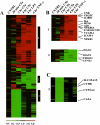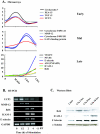C5a-induced gene expression in human umbilical vein endothelial cells
- PMID: 14982839
- PMCID: PMC1613300
- DOI: 10.1016/S0002-9440(10)63173-2
C5a-induced gene expression in human umbilical vein endothelial cells
Abstract
The endothelium plays a critical role in the inflammatory process. The complement activation product, C5a, is known to have proinflammatory effects on the endothelium, but the molecular mechanisms remain unclear. We have used cDNA microarray analysis to assess gene expression in human umbilical vein endothelial cells (HUVECs) that were stimulated with human C5a in vitro. Chip analyses were confirmed by reverse transcriptase-polymerase chain reaction and by Western blot analysis. Gene activation responses were remarkably similar to gene expression patterns of HUVECs stimulated with human tumor necrosis factor-alpha or bacterial lipopolysaccharide. HUVECs stimulated with C5a showed progressive increases in gene expression for cell adhesion molecules (eg, E-selectin, ICAM-1, VCAM-1), cytokines/chemokines, and related receptors (eg, VEGFC, IL-6, IL-18R). Surprisingly, HUVECs showed little evidence for up-regulation of complement-related genes. There were transient increases in gene expression associated with broad functional activities. The three agonists used also caused down-regulation of genes that regulate angiogenesis and drug metabolism. With a single exception, C5a caused little evidence of activation of complement-related genes. These studies indicate that endothelial cells respond robustly to C5a by activation of genes related to progressive expression of cell adherence molecules, and cytokines and chemokines in a manner similar to responses induced by tumor necrosis factor-alpha and lipopolysaccharide.
Figures


Similar articles
-
Protocatechuic aldehyde suppresses TNF-alpha-induced ICAM-1 and VCAM-1 expression in human umbilical vein endothelial cells.Eur J Pharmacol. 2005 Apr 18;513(1-2):1-8. doi: 10.1016/j.ejphar.2005.01.059. Eur J Pharmacol. 2005. PMID: 15878704
-
Gabexate mesilate, a synthetic anticoagulant, inhibits the expression of endothelial leukocyte adhesion molecules in vitro.Crit Care Med. 2003 Apr;31(4):1147-53. doi: 10.1097/01.CCM.0000060005.48885.2B. Crit Care Med. 2003. PMID: 12682486
-
[Effect of C5a on expression of thrombomodulin in endothelial cells in vitro].Zhongguo Wei Zhong Bing Ji Jiu Yi Xue. 2009 Mar;21(3):168-71. Zhongguo Wei Zhong Bing Ji Jiu Yi Xue. 2009. PMID: 19278588 Chinese.
-
C5a-induced expression of P-selectin in endothelial cells.J Clin Invest. 1994 Sep;94(3):1147-55. doi: 10.1172/JCI117430. J Clin Invest. 1994. PMID: 7521884 Free PMC article.
-
Regulation by complement C3a and C5a anaphylatoxins of cytokine production in human umbilical vein endothelial cells.FASEB J. 2003 Jun;17(9):1003-14. doi: 10.1096/fj.02-0737com. FASEB J. 2003. PMID: 12773483
Cited by
-
Immediate early inflammatory gene responses of human umbilical vein endothelial cells to hemorrhagic venom.Inflamm Res. 2011 Mar;60(3):213-7. doi: 10.1007/s00011-010-0286-1. Epub 2010 Dec 14. Inflamm Res. 2011. PMID: 21153857
-
Complement activation in the context of stem cells and tissue repair.World J Stem Cells. 2015 Sep 26;7(8):1090-108. doi: 10.4252/wjsc.v7.i8.1090. World J Stem Cells. 2015. PMID: 26435769 Free PMC article. Review.
-
The role of complement in inflammatory diseases from behind the scenes into the spotlight.Am J Pathol. 2007 Sep;171(3):715-27. doi: 10.2353/ajpath.2007.070166. Epub 2007 Jul 19. Am J Pathol. 2007. PMID: 17640961 Free PMC article. Review.
-
Complement 5a receptor inhibition improves renal allograft survival.J Am Soc Nephrol. 2008 Dec;19(12):2302-12. doi: 10.1681/ASN.2007111267. Epub 2008 Aug 27. J Am Soc Nephrol. 2008. PMID: 18753257 Free PMC article.
-
An Anti-C1s Monoclonal, TNT003, Inhibits Complement Activation Induced by Antibodies Against HLA.Am J Transplant. 2015 Aug;15(8):2037-49. doi: 10.1111/ajt.13273. Epub 2015 Apr 22. Am J Transplant. 2015. PMID: 25904443 Free PMC article.
References
-
- Madge LA, Poder JS. TNF signaling in vascular endothelial cells. Exp Mol Pathol. 2001;70:317–325. - PubMed
-
- Heumann D, Glauser MP, Calandra T. Molecular basis of host-pathogen interaction in septic shock. Curr Opin Microbiol. 1998;1:49–55. - PubMed
-
- Nooteboom A, Van Der Linden CJ, Hendriks T. Tumor necrosis factor-alpha and interleukin-1beta mediate endothelial permeability induced by lipopolysaccharide-stimulated whole blood. Crit Care Med. 2002;30:2063–2068. - PubMed
-
- Pohlman TH, Harlan JM. Human endothelial cell response to lipopolysaccharide, interleukin-1, and tumor necrosis factor is regulated by protein synthesis. Cell Immunol. 1989;119:41–52. - PubMed
Publication types
MeSH terms
Substances
Grants and funding
LinkOut - more resources
Full Text Sources
Other Literature Sources
Miscellaneous

